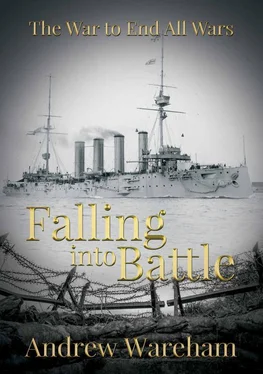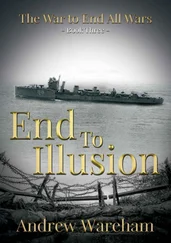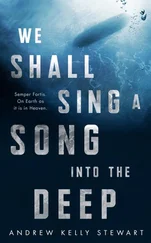“I fully agree, Sub. Do you know how to use a grappling hook?”
“I practised on the second-year cruise at Dartmouth, sir. On the sail training ship. We did all sorts of jolly things then – including laying out on the yards, which certainly equipped us for service in the modern Navy.”
Dacres smiled. Every fully rigged naval vessel had been scrapped nearly ten years previously when Fisher had become First Naval Lord. There was nothing in service now that could be powered by sail, other than the sail training ships which the Admiralty had fought to keep, it being so good for youngsters to learn their ways.
“Good for you, Sub. Everybody knows that.”
“Then how could I doubt it, sir. Is there any possibility of getting hold of bayonets? The Royal Marines use them. If we ever have to go below decks, clearing the accommodation perhaps, then stabbing with a bayonet makes more sense than trying to swing a cutlass in a confined space.”
“Sensible comment, Sub. Officially, it can’t be done. I’ll have a word with the captain and see what can be achieved.”
A dozen bayonets appeared a few days later, nothing said. Simon drilled his boarding party in fixing them and using the rifles in the correct fashion. They had handles and he did not doubt that they would be wielded dagger fashion if it came to business, but he had to at least pretend that all would be by the book.
Summer made for easier conditions in the North Sea and the flotilla was able to go out and practice more frequently until the order came that they were to join the Fleet assembly and review planned for July. The whole of the Navy – or all that was in Home waters – was to present itself for inspection and exercise in a great, jolly jamboree, much loved by Royalty, the newspapers and elderly admirals.
Captain Smallwood called them together in his cabin.
“The whisper is, gentlemen, that the mobilisation of the Fleet is part of an Admiralty plan to put us on war readiness. All reservists are being called back to duty for the fortnight and the vessels in mothballs are ordered to sea. What we are supposed to do with the relics of the Victorian age, I don’t know – but they will be there plodding along in their lines. They are pulling out the remaining predreadnought battleships and the heavy cruisers – the Cressy class especially. I suspect the idea is that they are big gun ships and will be able to support the army inshore or take on a coastal defence role. I suppose it is possible that the Germans could raid the East coast ports with the aim of sinking the colliers coming down from Tyne and Tees to London and the south. Millions of tons of coal, literally, each year – every power station needs coal and so do the factories, and we still have any number of coal-fired ships. Old battleships and cruisers could be useful to protect that trade and they might act as decoys, perhaps, to draw out German squadrons to attack them. The Grand Fleet will be at Scapa Flow and in others of the Scottish ports and could hope to sail and cut off the German Fleet if it sailed south. Be thankful we are posted to Harwich – I would not fancy Scapa Flow.”
The Flow was cold, wet and dreary – and that was the onshore facilities.
Dacres asked the questions.
“Is war a certainty, sir?”
“Captain D says that it’s just waiting for the excuse now. France and Germany actually want a rerun of 1870. The Kaiser hopes to have a justification for hitting into Russia. The Austro-Hungarians wish to unify their fissiparous Empire with a war. That’s a good word, by the way – Captain D was very proud of it; I didn’t ask him what it meant. Only the Ottomans don’t really want a war, and they don’t count. The word is that the Kaiser has offered India to the Ottomans, though he hasn’t said how he is going to deliver it.”
“The Army will definitely be going to France, sir?”
“Of a certainty. There will be an Expeditionary Force. We will be out to act as stoppers to the Channel. No cruisers to get through. Nor light craft if Germany takes any of the Belgian ports. They will be a damned sight more difficult to stop.”
“Shallow draught and picking their way through the shoals off coast, sir. Not easy to spot, let along sink.”
“Exactly, First!”
Simon, unthinkingly, asked a question, breaking the rule that junior officers should be seen, if it was essential, but never heard.
“What about submarines, sir?”
“No – nothing to worry about there. Official policy is that they will not be able to operate in the North Sea. They won’t be able to navigate the shoal waters submerged – their speed is too low to master the currents to be found there. On the surface, they are far too vulnerable to hope to survive.”
Lieutenant Dacres enquired whose official policy it was.
“Good question. Roger Keyes is Commodore Submarines, as you all know, and he believes the policy is so much bullshit. So it’s a matter of who you believe. Captain D don’t like Keyes – they were in China together when Keyes made his name at the Taku Forts and our man didn’t.”
They nodded gravely. It was a feud, and the Navy was full of those; most policy was determined by them.
“Right, sir. As far as Sheldrake is concerned, submarines are mythical. No consideration is to be given to countering them. Given that, sir, what are we to do about submarines?”
“Listen for them in the night. They have to charge their batteries and that is supposed to be noisy. Lookouts to be warned to be aware of high-revving internal combustion engines. In daylight, watch for periscopes and keep an eye out for low profiles such as conning towers close to water level. If seen, open fire immediately. Shell them to drive them under and keep them blind.”
“I did hear of depth bombs, sir, that could be dropped to explode under water.”
“I have heard of them too, First. Never seen one and don’t know how they would be put over the side. From the little I know, the submarine chaser has a hydrophone to stick under water to listen out for motors, and some sort of depth bomb launcher at the stern. That is everything I know. The lot!”
Lieutenant Dacres broke the following silence.
“Perhaps we should hope there won’t be any submarines, sir. Sub, are any of your boarders good shots with their rifles?”
“Don’t know, sir. Haven’t taken them to a range.”
“Pity. If any of them were marksmen, they could take their rifles on lookout with them and have a pot at any periscopes they saw. Break the glass, you know.”
They considered that. Captain Smallwood wondered just how effective it might be.
“Say from four hundred yards on a pitching and rolling ship at a target of what, less than a foot diameter? Good shooting, that would be.”
“Too good for me. What do you say, Harker?”
“Not a hope, sir. Might manage it in a flat calm. Even then I would rather use both four inch and the one twelve pounder that would bear. Three rounds rapid each might get close. With luck. Do better with one of those Zeppelins with bombs, sir.”
“They’re on the German side.”
“Yes, but we’ve got a few smaller ones, sir. In the RNAS. They might be the answer.”
Captain Smallwood summed up.
“But not a destroyer, it would seem. We must concentrate on what we can do. There are to be dummy torpedo firings, Mr Harker. Use the opportunity to train up two full crews and as many replacements as possible. Sub, you will shadow Mr Harker. If he is disabled, you will take his place.”
“Aye aye, sir.”
It was a direct order. It must be obeyed. Simon buttonholed Mr Harker later and begged the use of any manuals he possessed relating to the torpedoes.
“Easy enough, Sub. Simple sums. The captain will tell you the ship’s course and speed. You know the speed of the torpedo. You calculate the speed of the target and observe its course, taking note of any zigzag. You then work out the triangle to tell you how far ahead of the target you must aim. Then you gallop to the second tube and do the same.”
Читать дальше












